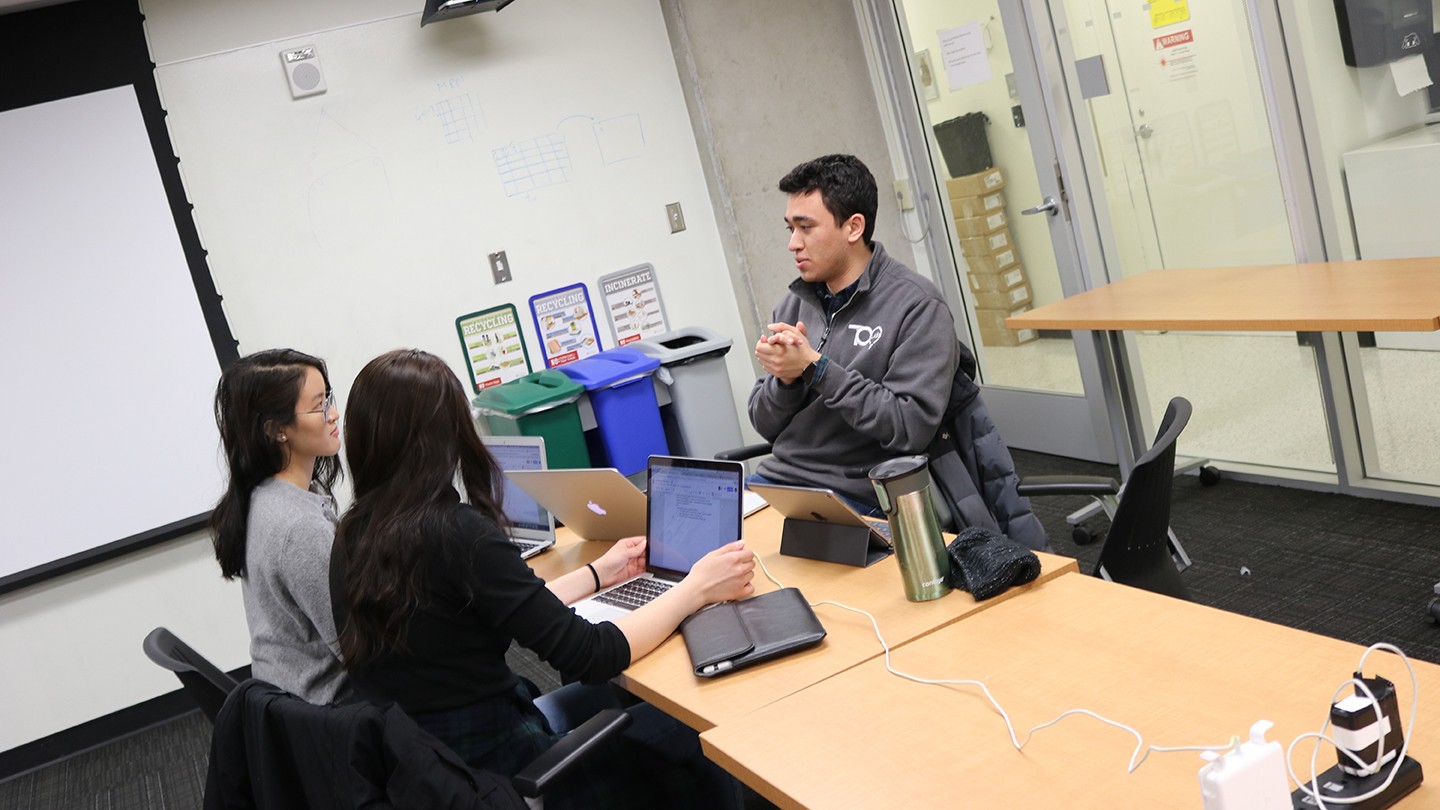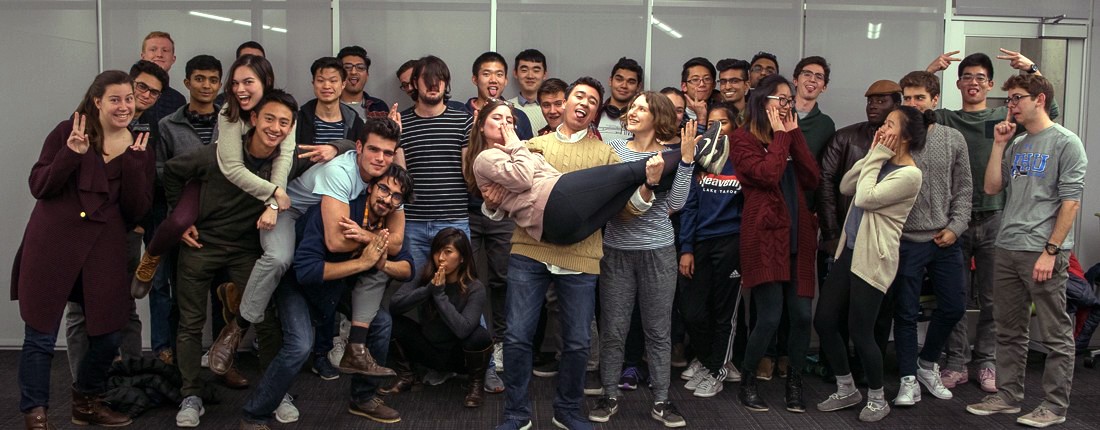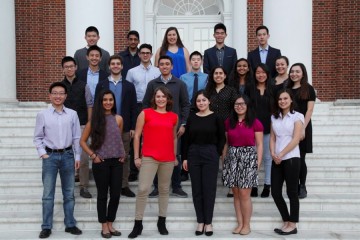You're a student, and you've got an idea for a new app. It's handy. It's intuitive. It solves some commonplace problem you've encountered yourself too many times to count. This idea of yours is going to take off, you know it.
But how do you juggle schoolwork on top of learning the ins and outs of starting a business?
Luckily for Johns Hopkins students, there's a Hatchery for that.
The Hatchery is a new student-focused incubator run by and administered by—you guessed it—students. It provides mentorship, training, and other resources to tech startups, small businesses, and nonprofits in the earliest stages of their development. The incubator is overseen by Pava LaPere, a Johns Hopkins junior and an executive committee member of TCO Labs, an organization that works to support the entrepreneurial ecosystem at Johns Hopkins and get students involved in Baltimore's innovator community.
The Hatchery recently announced its second cohort—12 teams who will have access to training workshops, dedicated mentors, and competitive funding awarded after they demonstrate their ventures in April.
"Entrepreneurial activity goes on at Hopkins under everyone's noses," says LaPere, a sociology major. "Trying to launch a business in school can be an extremely isolating experience, and students can sometimes feel limited by the title of 'student.' With the Hatchery, we want to show them that the world will give you so much if you just go out and seek it."

TCO Labs was founded in 2015 by Anthony Garay, now a junior, who wanted to help unite resources and groups dedicated to small business development at Johns Hopkins. TCO Labs works to accomplish three overarching goals: integrating business training into Johns Hopkins curricula; community-building on the university's Homewood campus and beyond; and providing educational opportunities to students, whether in the form of free and open workshops or in the form of the Hatchery incubator.
They work alongside other campus-based business groups and accelerators such as the professional business fraternity Alpha Kappa Psi, the Whiting School's Center for Leadership Education, and Johns Hopkins Technology Ventures' FastForward U to create a pipeline of opportunities for growing student businesses.

Image caption: Anthony Garay (right) mentors Jamie Chen and Madison Bozich to help bring to life their app idea that helps students find study locations around campus
Darius Graham, director of student ventures at Johns Hopkins Technology Ventures, says TCO Labs is part of an environment he and his colleagues are building at JHU that supports student-run businesses.
"At FastForward U, we work to teach students business skills and competence so they can become problem-solvers and build viable ventures, but we need a variety of groups to get students excited and to build a thriving ecosystem," says Graham. "Student-led efforts like this one give students even more opportunities to connect with each other and form ideas that we hope to see funded and grown through the competitive funding programs that FastForwardU offers."
LaPere says that the Hatchery aims to help teams overcome an early obstacle that often prevents students from pursuing their startup goals: filling in the knowledge gaps when it comes to starting a business.
"You have to lay a certain amount of groundwork to join accelerators and apply for funding," she says. "In some cases, the rope doesn't come all the way down and the ladder doesn't reach all the way up—that's where we come in. We help get these new businesses off the ground and ready for their next steps."
An added bonus, says Dimitri Simes, an international studies major and a Hatchery cohort member, is that Hatchery mentors understand the demands of being a student at Johns Hopkins.

Image caption: Including undergraduates as well as grad students, the TCO Labs team is now 51 strong
Image credit: TCO Labs
"From a logistical standpoint, it's easy to work with student mentors because they operate basically on the same schedules that we do," says Simes, part of a team working to launch The Realist Review, a national student-run foreign policy publication. "Students generally are free in the evening, but administration and business entities operate during the daytime, so it makes scheduling far easier."
Adds LaPere: "Student entrepreneurs operate under very unique parameters, but we're sitting next to them in classes, we're up late working in Brody like they are. We're embedded in their networks because we are their networks."

As the sun sets on the Homewood campus on a cold, windy Wednesday in March, three students huddle around a table strewn with winter coats and laptop sleeves. Anthony Garay sits across from two students who are new members of the Hatchery. They've been developing a mobile app that alerts users to available study areas around campus. Garay asks them questions about their prospective launch date to gauge their venture's progress.
"I think April, for a prototype, is doable," says sophomore Jamie Chen, an economics and public health studies major. She glances sideways at her teammate, Madison Bozich, before clarifying her answer. "I think we could get at least one sensor that hooks up to an app—that if you go in front of the sensor, the app tells you whether you moved. That's the minimum viable product."
They've already done some market research for their idea, finding corporate parallels that use motion sensors to track employee movement throughout a building. Garay advises them to look into other potential competitor markets.
"What you're really looking at is a product with two customers—the students and the universities," he says. "It's not just an A to B business, it's more like A to B to C."
The women nod and take notes. During a break, Chen shakes off her nerves.
"This is great," she says, laughing. "I feel like I'm meeting with my guidance counselor."
None of them gives any indication that they're ready to wrap up their meeting, despite having just finished an 80-minute Hatchery workshop on the fundamentals of incorporating a business. The workshop, led by students from the University of Baltimore School of Law and overseen by intellectual property expert Max Oppenheimer, attracted a few students unaffiliated with TCO Labs, but mainly drew members of the Hatchery cohort, who raised questions about tax liability, LLCs, and logos.
This month the teams also met, digitally and in person, with professional mentors LaPere recruited from the Venture for America network. These pros provide industry-specific knowledge to teams and prepare them for pitching and promoting their businesses.
The teams will show off their newfound business know-how during the Hatch 2018 conference in April, where they will present their ventures to their peers and potential investors. There, they will compete for cash prizes. The Spring 2018 cohort officially ends May 4, but LaPere hints that the support offered by the incubator will continue beyond then.
Debanik Purkayastha, a biomedical engineering and computer science major, says working with the Hatchery has been a valuable experience. He's part of the venture Collab, which seeks to create an app-based social network for creative people to collaborate on projects. LaPere serves as his team's student mentor.
"It's so nice to just connect with other people who are student entrepreneurs," he says. "Pava's been giving us deadlines and goals to reach by the end of the semester, and the network of people here has kept us motivated and let us set our vision and keep moving, and keep making progress. The way this whole organization is framed makes us feel like what we're doing is valid and that we have the potential for success."
Posted in Science+Technology, Student Life
Tagged entrepreneurship, startups, johns hopkins technology ventures









